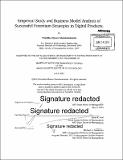Empirical study and business model analysis of successful freemium strategies in digital products
Author(s)
Shankarananda, Pronitha Mysore
DownloadFull printable version (12.00Mb)
Other Contributors
Sloan School of Management.
Advisor
Sinan K. Aral.
Terms of use
Metadata
Show full item recordAbstract
"Freemium" has become a popular business model for digital and internet startups to acquire customers quickly and monetize with limited marketing resources. In this model, basic functionalities and features of the product are offered free of cost and advanced features are monetized. Typically firms rely on the size of the free user network since the conversion rate in these models is very low (2%-7%). This thesis analyzes successful business models and uses predictive analytics on a dataset from a freemium product to determine critical success factors. Empirical study is conducted on 79,033 total users and 4,217 premium subscribers of Last.fm, a Musica as a service (MaaS) product which employs the freemium pricing model, to predict the probability of a user being a subscriber. Classification and regression trees (CART) with k-fold cross validation is used to model on the training data and is validated on the test dataset to understand the influence of demographic, engagement, retention and social factors on subscribers. Five successful premium companies Linkedln, Zynga, Evernote, Spotify and DropBox are studied to understand the company background, value proposition and freemium model. The analyses was based on secondary case studies and information. The CART model designed yielded an accuracy of 74.84%, sensitivity of 67.6%, false negative rate (FNR) of 32.4% and Area under the curve (AUC) of 0.7474937. On fine-tuning the penalty matrix, FNR is reduced to 22% and sensitivity increased to 78% with an accuracy of 65.8%. The empirical study showed that age (demographic factor), playcount (engagement factor) and registration unixtime (retention) were the most significant variables in predicting outcome. Study of successful firms showed that freemium is not a one-size-fits-all strategy for internet startups. The strategy needs to be crafted specifically for each firm. Many factors go into formulating this plan including a strong product catalogue, focused customer acquisition engine, referrals, social and community features, continuous testing, data driven approach and commitment to continuous innovation.
Description
Thesis: S.M. in Management Research, Massachusetts Institute of Technology, Sloan School of Management, 2015. Cataloged from PDF version of thesis. Includes bibliographical references (pages 54-58).
Date issued
2015Department
Sloan School of ManagementPublisher
Massachusetts Institute of Technology
Keywords
Sloan School of Management.